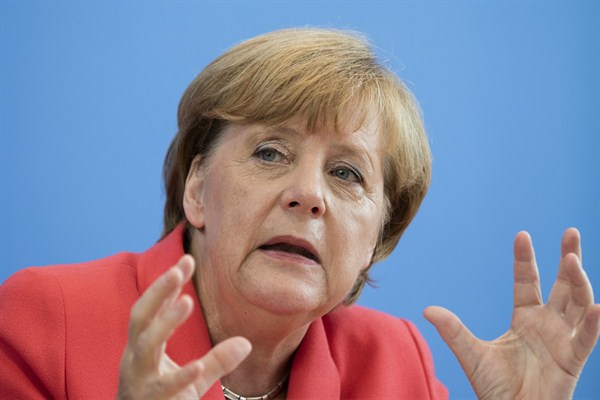Under Chancellor Angela Merkel, the longest-serving head of government in the European Union, Germany has assumed a central role in a changing Europe. But in both the EU and the world beyond, Berlin often seems a reluctant power, even as Merkel’s popularity at home masks underlying challenges.
All of the articles linked below are free for non-subscribers until Sept. 17.
The View From Berlin:
In winning a third term as chancellor in 2013, Merkel extended the Christian Democratic Union’s hold on power and cemented her dominance of German politics. But she was once again forced to form a coalition government with the Social Democratic Party (SDP), one of many signs that, beneath the surface, her political position could be more tenuous than it seems.
Merkel’s Big Victory Shakes Up German Party System
Although it was anticipated, the success of Angela Merkel’s CDU in the September 2013 elections was more sweeping than expected. Shortly after the vote, Catherine Cheney explained why the party’s victory shook up Germany’s political system and cost Merkel an important coalition partner, the Free Democratic Party, leaving many to speculate about who would fill its shoes.
Just three weeks after the 2013 election, the Social Democratic Party approved a coalition agreement with the CDU. Though it broke the limbo and uncertainty that followed the vote, Hannes Cerny noted that “Merkel’s third Cabinet commenc[ed] work amid strong signs of overall continuity,” notably in German foreign policy.
Although “on the surface, today’s Germany appears a model of harmony and consensus,” Paul Hockenos wrote in February that Merkel’s “conservatism fit for the 21st century” is a divisive force among German conservatives that has “made Merkel’s hold on power more tenuous than ever before.” Still, a partisan shift is a “long way off,” as Merkel “still has the mainstream firmly in her pocket.”
Germany in a Changing European Union:
Since 2010 and the outbreak of the Greek and European debt crises, Germany’s position as Europe’s largest and most fundamentally sound economy has made it a dominant voice in the dramatic and often acrimonious EU policy debates that followed. But Berlin often must reconcile external and internal pressures, including sensitivity at home and abroad over Germany’s newfound influence, in helping to shape the union’s policy.
Germany’s New Role in Europe
Both the 2009 Lisbon Treaty and the sovereign debt crisis upended the European Union’s day-to-day functioning and empowered the European Council as “the center of both crisis management and governance reform.” Reflecting in 2012, Daniela Schwarzer explained that this made Germany the union’s “most influential member state,” and a central force in shaping the politics of European integration.
Following the heated talks over a third bailout for Greece in July, Daniela Schwarzer explained the “stark contrast” between international critics of the terms Germany imposed—who describe them as a “German diktat”—and the view from Berlin, where policymakers “regard the compromise found as a rather bad deal for both sides, and not as a German victory.” Varying pressures have complicated Merkel’s task to “assume Germany’s European responsibilities and also satisfy her domestic critics.”
Following the left-wing Syriza party’s February Election victory in Greece, some feared it could exacerbate a breakdown in the EU’s front against Russia over Moscow’s actions in Ukraine. But Richard Gowan wrote that month that the development is unlikely to tip the balance: “Greece cannot use its theoretical formal leverage in the EU to stop Europe’s real powers from making real decisions about how to deal with Moscow.”
Germany and the World:
Meanwhile, even as Germany’s influence within the European Union has increased, Berlin has been reluctant to engage as a normal power in the world. Though many feared Germany might seek to use its raised profile to pursue a more unilateral approach, it has instead demonstrated consistency in its foreign policy—for better and for worse.
Strategic Posture Review: Germany
Writing in March 2014, Patrick Keller assessed the strategic outlook of Germany, “a state that, in terms of population size and industrial capacity, overshadows all other European nations, yet is too weak to rule the continent, as two world wars have disastrously proved.” Keller argued that Germany should lead Europe “to a more creative, more insistent and more effective EU foreign policy.”
Some contended that Germany’s handling of the sovereign debt crisis signaled its waning interest in Europe and foreshadowed a pursuit of a more unilateral foreign policy. This is not the case, Ulrike Guérot argued in February 2012, though she added that “German foreign policy is no longer unambiguous, to say the least.”
Writing in January 2013, Isabel Skierka described Germany’s decision to limit its participation in the French intervention in Mali to logistical support and humanitarian assistance as consistent with its absence from its partners’ military efforts. However, she argued, Germany should instead “reconcile its foreign policy with the challenges of a changing global order,” balancing its reticence to engage militarily with its desire to support its allies.
More World Politics Review

